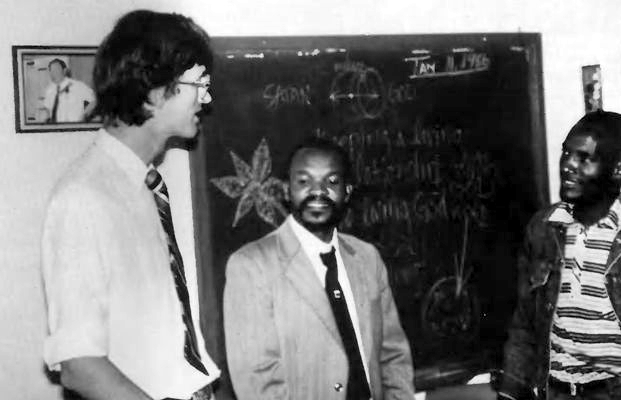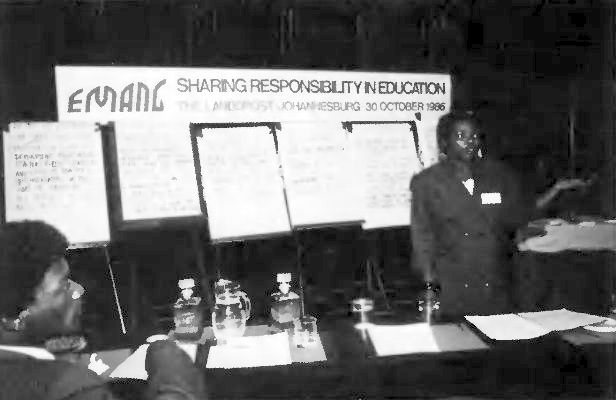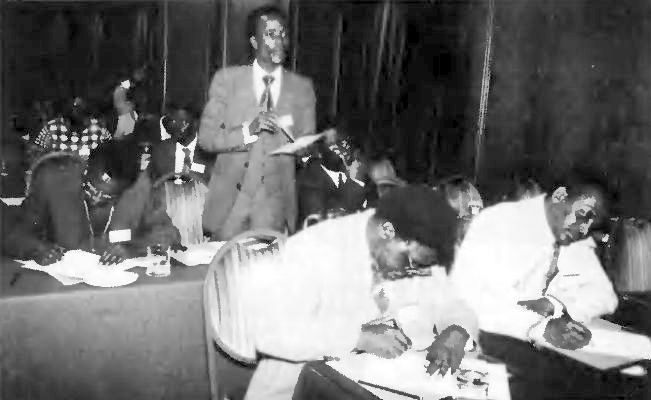![]()
The Words of the Halenke Family
|
|
The Words of the Halenke Family |

Wilfred
Halenke and two guests discuss the Principle.
The groundwork for the Unification Church in South Africa was laid 17 years ago. The first missionary, a South African who had joined the church in Holland, went there in 1970. When the German, American, and Japanese missionaries arrived in 1975, they came upon the foundation of five years of his hard work. Eventually they were able to do even more than this brother, who had had to take care of his family and hold down a job. Through various struggles, the church grew and developed.
Although we have always witnessed to everyone, black people have been more responsive than whites because they are searching more for answers. So the majority of our full- time members are black.
In the last few years, the social situation in South Africa has become hostile and tense, and so for us it has become increasingly difficult to witness to people or for them to respond. Whites don't feel the tension s much, but blacks do. They even seem less at ease listening to the Principle than in the past. But what seems to be developing far beyond our expectations is our public outreach, in which people in influential positions are offered a public forum through us that they wouldn't otherwise find. Our efforts in this area have been quite effective.

Smileth
Ntutele, a teacher, gives a presentation at our second EMANG
conference.
One of our newest outreach programs is an ecumenical association of ministers called EMANG -- Ecumenical Movement for the Advancement of National Goodwill. In the Susutu language the word emang means "stand up and be counted." We try to generate the feeling that all the people in South Africa belong to one nation despite our many differences. We don't want EMANG to be just a project of the Unification movement; we hope it can be the spark to set off a movement that ministers can feel is truly their own.
Two very courageous ministers, one white and one black, helped us to found EMANG. We invite ministers of all races and denominations to our conferences, and we also try to get a balanced representation of conservatives and liberals, which has been far from easy to do.
We got our feet wet with several small meetings; then we held our first major conference in July 1986 on the topic "Education and Liberation." A number of prominent professors from local universities came to address the crisis in the schools. There is a major problem in South Africa now -- that of leftist students boycotting the schools. If other students try to enter the schools, they are threatened with violence, so out of fear they stay away. You can't run a school system if the students don't show up. The kids just hang around in their neighborhoods, join gangs, start fires, and cause a lot of trouble.
The speakers took different sides of this controversial issue, and the discussion that followed was very stimulating. The participants learned a lot from each other, and I think all of them realized that they had not listened deeply enough to the other side's view in the past. Although we didn't solve the education problem, we made significant steps in the direction of defusing this social time bomb. We knew we weren't likely to get any acknowledgement from the government officials for this conference, but surprisingly, we did receive some favorable response from them.
Our second conference, held in late October 1986, was called "Sharing Responsibility and Education'.' Because of the success of the first conference, which had brought about 20 participants, 40 to 45 people attended this one. The conclusions reached in this second conference were quite enlightening, and we plan to print and distribute a small booklet about the proceedings.
Another type of outreach we have started is our New Vision Seminars, which are designed to reach teachers and educators, many of whom are leaders of opinion in the black community. We developed these seminars to appeal to the majority of South African blacks, who feel left out and alienated from the present system. They believe that since the Western free market system seems to favor whites, communism must be the way for blacks. A large percentage of blacks, and particularly black leaders, are already strongly influenced by the left.
We wanted to educate people clearly about Godism, but we knew that if we took too much of a conservative stance or appeared too strongly anti-communist, we would alienate a majority of the population and push them into the arms of communism. Through much prayer and thought, we received from God the idea of starting the New Vision Seminars.
In the course of a one-day New Vision Seminar we present critiques of both capitalism and communism -- which in Africa is usually called socialism. We objectively point out the weaknesses of both, leading to the conclusion that neither can provide any final solution. Then we introduce the Unification movement and Father's vision as an alternative, a way superior to both.
We present summaries of the Principle of Creation, the Fall of Man, and the Principle of Restoration, along with a lecture on Father's life. South African blacks are able to respond right away to Father, as a man who started all alone and with nothing, suffered tremendous persecution in his fight for human rights, and developed a far-reaching, universal vision. Based on Father's example, we encourage people to develop faith in God, reminding them that while many people have tried to live unselfishly, it is only the power of faith that can overcome the temptations of power, money, and fame.
Most thinking people in the black community have rejected religion as part of the present oppressive capitalistic system, so our initial approach in this seminar is rather secular. But by the end, most of them discover religious feelings inside them that they never had a viable way of expressing before.
At first, the teachers who came were afraid about getting involved in anything, because they have been under constant pressure from the government on one side and the radical students on the other. But these seminars have given them something to believe in and to have hope in, and they are starting to tell their friends about us.
We don't try to convince the participants to become Moonies; we appeal to them, as religious people, to work with us centered on Father's view and the Unification movement. For those who are interested in knowing more, we teach a five-day Principle workshop at our training center in Johannesburg. At the end of the workshop, we ask them to sign associate membership and encourage them to work with the movement in any way they can to help realize Father's universal dream.

A
point is made by a participant at our first EMANG conference.
Our movement is in a unique position because we are not so well known. Therefore, we are not associated with either the government or the revolutionaries. We want to make all our conferences objective and give everybody a chance. While our church does not condone the objectionable policies of the South African government, we want to address what there is that is good. To throw the good out with the bad, as much of the world does, is to write off South Africa entirely. We could not continue to exist if we took that stance. But most importantly, it would not be right.
I think it is largely because of this policy that the government officials don't see us as the enemy. We aren't exactly their friends either, but they tolerate our movement and even see it as helpful because we are not trying to polarize and divide the nation but bring unity.
One thing brothers and sisters in other parts of the world should understand is that we always have to bless the good in the existing government. I recently saw a videotape from our members in the Ivory Coast, and a brother giving a speech before the minister of health said, "God bless the Ivory Coast and God bless the president of the Ivory Coast." He said this about three times in his speech.
I had to smile because this kind of thing is really necessary for the survival of any of our missions in Africa -- to be sure to emphasize the good. We have to give credit where credit is due.
We always openly invite government representatives and their friends to our conferences so that they can see we are not subversive, and that we are only trying to be mediators of peace and harmony. Some people think that just pushing the white minority out of power will solve all the problems, but they are wrong. Whites as well as blacks need to be involved in any solution to this country's problems.
Actually, most of the people here are very distrustful of any group espousing a cause. You have the government trying to keep people on their side and the socialists trying to pull people to the left. People of conscience are wary of associating with anyone or any public organization because they don't want to be manipulated. There are a lot of good people in South Africa who don't have a proper forum from which to speak, so that is why these different types of conferences we are holding are so valuable.

The
ministers who come are serious in their commitment.
Most of our activities are centered in Johannesburg. Since there is always suspicion there, especially from the government, when both races are involved, we cannot operate too openly. We have gone overboard to make sure everything we do is strictly according to law. Our members are really to be admired for the way they persevere under the pressure of the radical students, or the "comrades" as they call themselves, on the one side, and the government on the other.
Of course we fundraise as many churches do, and we have the freedom to do that. But our members are mostly black, and the people who have the money are white. Going door- to-door in a white area day and night is not easy if you are black. But our brothers and sisters are determined not to become bitter at the sometimes terrible things that are said or done to them. All of us have been bitten in the legs many times by dogs that are turned loose on us. A few brothers have been punched or spit at. But some of our most successful fundraisers are the ones who strive valiantly to forgive in their hearts and overcome resentment. What South Africa needs is young people like this who can forgive others with the love of God, heal the wounds of the past, and create a foundation for a new future.
We have one MFT in the country, and some small businesses have been started to support our work. We are also grateful for the effort and support of the brothers and sisters at the New York headquarters of IRFF and the World Mission Department, for without their help, we could really do very little here.
As a church, we don't concern ourselves with politics at all. This is not just to avoid trouble with the government, but because even among our members there are those with radically different political views. We have an unspoken agreement not to talk about politics. The point on which we can always unite and feel like a family is the Principle, the word of God.
Our work here is sometimes accomplished in the face of grave danger. We have a center in Soweto, a black community that was recently torn by riots. During the rioting, gangs of teenagers would roam the streets, throwing rocks and gasoline bombs. Gasoline bombs are glass bottles filled with gasoline that are lit and then hurled against a car or a building. On impact, the burning gasoline spreads, causing terrible destruction and death.
Gangs often "necklace" a person they suspect of informing the secret police of their activities. They fill an old tire with gasoline, throw it over someone's neck, and then light it. You can imagine what happens to that person. This is done even by blacks against blacks. It's just mob mentality. They take the opportunity to kill for personal reasons and give it a political justification.
Sometimes during that difficult period, the members were too afraid to go back to the Soweto center at night, so they would stay in our center in Johannesburg. Sometimes we couldn't even go in there to take care of our home members. Between the army, with their armored cars and their guns, and the gangs constantly running around, nowhere there was it safe, especially for a white person.
One day one of our black brothers drove to Soweto in the van. He dropped someone off, and as he was just getting back in, he saw a group of teenagers coming toward the van. Gangs are notorious for hijacking vehicles. They hold a knife to the driver and tell him where to drive.
But our van had a cut-off switch for the ignition that I had installed so it couldn't be stolen. Our brother thought quickly and shut off the switch under his seat. When the teenagers came up and told him to drive them somewhere, he tried to start the van, but nothing happened. He tried and tried and acted like he was really sorry. They even attempted to push-start it, but it just wouldn't go. Finally they cursed the van and took off to find another one. When they were out of sight, our brother flipped the switch and drove away. It was funny in a way, but at the same time it was a very close call.
One night another brother driving a vanload of members came upon a bunch of kids who started surrounding the van and shouting obscenities. On that day our brother felt so sick and tired of this stuff that he shouted at the kids to shut up and get lost. He could easily have been killed, but somehow, because of the sound of his voice, the kids got scared and ran off.
This happened at the peak of the violence connected to the camera crews that were always going in there. Since the cameramen have now been blocked from entering, the violence has diminished. I think many incidents were staged to impress the international TV crews.
In another incident, I was fundraising with a black sister, Pauline, in a white area. When I came to the house where she was, I heard a white woman screaming at the top of her lungs at her, calling her a communist and other terrible things. I went in to talk to that woman because I couldn't stand the way she was treating Pauline. But the woman started screaming even louder at me. Pauline and I hadn't known that earlier in the day a terrorist bomb in Victoria had killed 20 people. Here we were, a white and a black, both being screamed at and accused of being communists. Through this we could understand the extreme and irrational emotions that flare when violence erupts. It is certainly a challenge to remain humble and faithful under any circumstances and to continue making spiritual conditions so the people of this country can receive the truth.
Members have made many tearful prayer conditions and worked countless hours to strengthen our foundation here. I hope that members around the world can pray for the brothers and sisters sacrificing so much for this country. I'm sure that would contribute greatly to our work here.
If South Africa cannot resolve its racial problem peacefully, a bad precedent will be set for all the racially mixed societies in the world. South Africa may be currently on the front line of the struggle against racism, but it is an issue that affects all countries around the world. It is imperative that we try as much as we can to unite brother and sister, black and white, liberal and conservative. This can create a foundation for all the people of this country to unite, to forgive each other, and to be able to change their tears of suffering into tears of joy by recognizing each other as the sons and daughters of God.
You don't read about us in the Johannesburg papers, but we are working quietly and steadily, with the confidence that there is hope for an end to this suffering and violence and the beginning of South Africa's restoration. We are making great efforts to share our dream with others, a dream of hope not only for South Africa, but for the world.